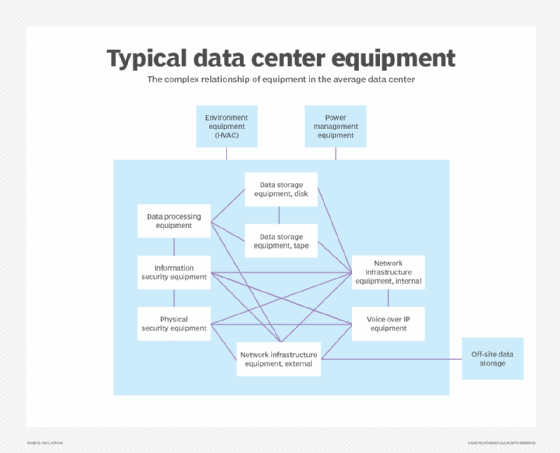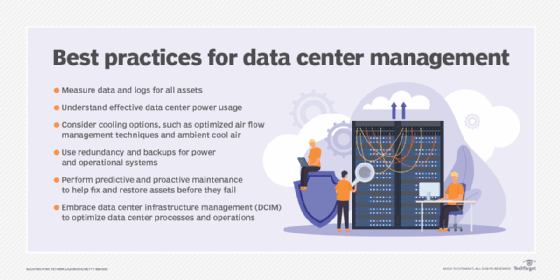data center management
What is data center management?
Data center management refers to the set of tasks and activities handled by an organization for the day-to-day requirements of operating a data center.
Data centers are increasingly complex facilities to operate, involving the management of hardware, software, services and physical infrastructure. On the hardware side, data centers include many types of equipment, including compute and storage hardware that needs to be managed for ongoing operations. Software and virtual workloads that run on racks of server hardware in a data center are often also within the purview of data center management operations.
Managing the physical infrastructure of a data center is another primary task within the domain of data center management. The physical infrastructure includes the power and cooling required for regular operations, as well as backup systems for disaster recovery, power interruptions, and security and access control to the data center premises.
All data center operators -- whether they're enterprises, hyperscalers or cloud service providers -- need to have human IT staff in place to handle some of the physical hardware and software management operations. Capacity planning, sometimes referred to as business service management, helps operators plan for current and future needs.

Managing data center capacity
Managing data center capacity is a primary element of data center management. A key data center performance indicator is understanding how much of the resources, such as hardware and power, are used at any given time.
Data center capacity management starts the design of the facility. An operator needs to set goals and expectations, and then calculate a facility's initial capacity and how much it can expand over time to reach a peak capacity. The capacity is a function of the available floor space, compute, storage, and power and cooling capabilities.
While hardware and power resources can often be constrained by the physical limitations of a facility and the local power grid, deploying virtualization, containers and microservices for workloads can help to improve efficiency and utilization of operations.
Challenges of data center management
Data center operators face multiple management challenges, including the following:
- Capacity management. Managing the available resources to meet user demands is always a challenge.
- Service-level agreements. Beyond just managing capacity, data centers need to operate at specific levels of availability and performance to comply with SLAs.
- Change management. There's a need to constantly iterate on hardware and software within a data center. Managing the changes, and the processes that enable change, can be a challenge.
- Disaster recovery. Businesses should prepare their data centers for unexpected events, such as a power failures, cyber attacks or hardware issues.
- Real-time reporting. The ability to provide real-time data on the state of all data center operations at any given point in time is often a complex issue.
- Security. Physical security for data center assets and IT security for running workloads in a multi-tenant data center can be complicated.
- Power management. Managing the power utilization of data center operations is an ongoing challenge for many operators who aim to balance power consumption and cost concerns with the need to maintain SLAs for running workloads.
How DCIM software can improve data center management
Data center infrastructure management (DCIM) software provides the tools and capabilities operators require to manage ongoing operations.
DCIM tools provide data center operators with real-time management visibility into the IT equipment. This can include server hardware, network switches, and power and cooling across a single facility or group of facilities.
Instead of just looking at a specific IT asset in a data center, DCIM takes a holistic look at all systems to provide a comprehensive view of operations. However, DCIM isn't just about monitoring. Well-implemented DCIM tools also enable operators to control data center assets and provide predictive capabilities to prevent downtime.
Among the promises of a well-implemented DCIM deployment is increased uptime, optimized energy consumption, incident management and capacity planning.
Best practices for data center management
The following best practices can help businesses build and maintain strong data center management strategies.
- Measure everything. You can't accurately manage anything without first measuring it. Having data measurement and logs for all assets in a data center is important.
- Understand effective power usage. PUE is among the most critical metrics for data center management because it helps operators to understand how efficiently power is used.
- Consider cooling options. Cooling is one of the most power-intensive aspects of data center management. Using optimized air flow management techniques and ambient cooler air in certain climates can help to lower costs.
- Backup and more backups. Redundant systems and backups for power and operational systems is an important best practice.
- Predictive and proactive maintenance. Waiting until a given data center asset fails before replacing it is a risky proposition that can affect availability. Predictive and proactive maintenance and replacement policies help fix and restore assets before they fail.
- Embrace DCIM. For a successful DCIM implementation, organizations need to be aware of and have the right deployment DCIM technology to help them optimize data center processes and operations.

Future of data center management
Among the leading data center management is the emergence of hybrid data centers, which have both public and private cloud elements. Organizations are looking to manage all data center assets, whether it's a public or private cloud or a traditional on-premises data center deployment, with a single set of tools.
Increasing remote management of data centers is another growing trend. While onsite operations control rooms might still be present, data centers are likely to be operated in the future with remote monitoring and control from a DCIM system.
There's also likely to be more AI-based capabilities in data center management operations with an AIOps approach. AIOps paired with additional remote management could enable a data center to be optimized by AI and run without the need for much human interaction.






